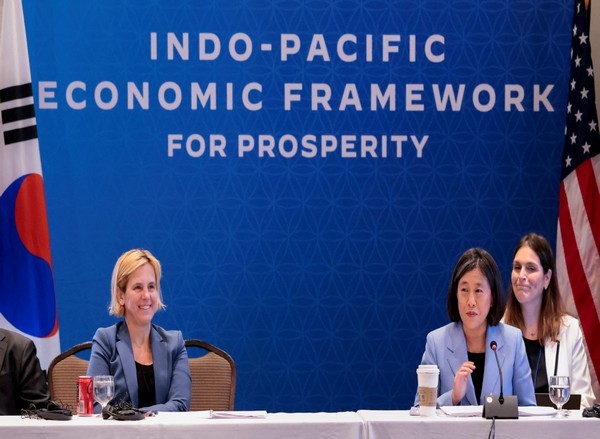The IPEF agreement, relating to supply chain resilience is also referred to as the Supply Chain Agreement….reports Asian Lite News
The US Department of Commerce on Thursday announced that the Indo-Pacific Economic Framework for Prosperity (IPEF) Supply Chain Agreement will be enforced on February 24, further emphasising that it will promote coordination among the IPEF partners on building efficient, secure and fair supply chains.
The IPEF agreement, relating to supply chain resilience is also referred to as the Supply Chain Agreement.
“The U.S. Department of Commerce today announced that the Indo-Pacific Economic Framework for Prosperity (IPEF) Agreement Relating to Supply Chain Resilience, generally referred to as the Supply Chain Agreement, will enter into force on February 24, 2024,” the US Department of Commerce said.
“This is a critical step in bringing the landmark, first-of-its-kind agreement into action and promoting coordination among the IPEF partners on building resilient, efficient, productive, sustainable, transparent, diversified, secure, fair, and inclusive supply chains,” it added.
The 14 IPEF partners include the US, India, Australia, Brunei Darussalam, Fiji, Indonesia, Japan, the Republic of Korea, Malaysia, New Zealand, the Philippines, Singapore, Thailand, and Vietnam.
The partner countries have negotiated the IPEF Supply Chain Agreement to establish a framework for deeper collaboration to prevent, mitigate, and prepare for supply chain disruptions, such as those experienced in recent years from the COVID-19 pandemic.
US Secretary of Commerce Gina Raimondo expressed the feeling of joy to witness the continued commitment and enthusiasm of the IPEF partners to make concrete progress in record time
“I am thrilled to see the continued commitment and enthusiasm of the IPEF partners to make concrete progress and deliver tangible outcomes in record time,” she said.
“With the IPEF Supply Chain Agreement shortly entering into force, we will now move forward and work collaboratively through this innovative framework with the goal of strengthening our supply chains and preventing potential disruptions before they arise for the collective benefit of our countries’ workers and businesses,” Raimondo added.
Five IPEF partners, Fiji, India, Japan, Singapore and the US have deposited their instruments of ratification, acceptance, or approval since the signing of the IPEF Supply Chain Agreement in November 2023, which has triggered the Agreement’s entry into force provision.
Following the Agreement’s entry into force, their focus will shift to establishing three supply chain bodies; the Supply Chain Council, Crisis Response Network, and Labor Rights Advisory Board.
“With the Agreement’s entry into force on February 24, 2024, the focus in the coming months will turn to various milestones set out in the Agreement related to establishing three supply chain bodies – the Supply Chain Council, Crisis Response Network, and Labor Rights Advisory Board…,” the US Department of Commerce stated.
It will further include, identifying the representatives to the Agreement’s three supply chain bodies by no later than March 25.
Second, selecting the chair of each of the supply chain bodies by April 24, adding that each body adopts the terms of reference by no later than June 23.
It further said that they have to identify and notify the partners of each country’s list of critical sectors and key goods for cooperation under the Agreement by no later than 120 days after the date of the entry into force for each country.
Lastly, “developing the guidelines for the facility-specific reporting mechanism on labour rights inconsistencies in IPEF supply chains by no later than August 22,” the statement said.
Notably, the IPEF Supply Chain Agreement was negotiated as per the Ministerial Statement on Pillar II (Supply Chains) released during the IPEF Ministerial meeting in September 2022 in Los Angeles, California.
“Negotiations were substantially concluded in May 2023 after approximately six months of negotiations. The text of the agreement was made public in September 2023,” it said.
Moreover, US Commerce Secretary Gina Raimondo and her counterparts formally signed the landmark agreement on November 14, 2023, in San Francisco, California. (ANI)
ALSO READ: Biden administration approves $4 billion arms package sale to India

